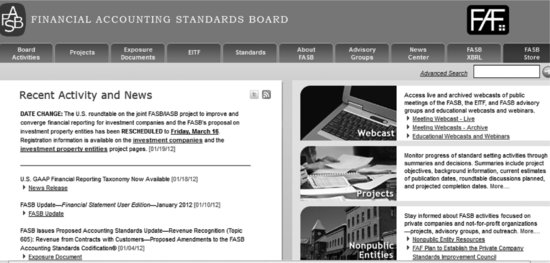CHAPTER THREE
Organising and collecting data
AS IS APPARENT WHEN ENTERTAINING THE DEMANDS of modern management and business reporting requirements, the organisation and collection of data are essential processes. This section explores associated elements, specifically:
- FASB codification and XBRL taxonomy;
- illustrative financial statements;
- data collection and XBRL for other standards, GRI and taxation, VAT;
- content analysis.
3.1 FASB CODIFICATION AND XBRL TAXONOMY
The Financial Accounting Standards Board is another important institution associated with the IFRS and thereby is connected with XBRL, too. It is beneficial, therefore, to provide preliminary information about this entity. More details can be found via the related home page at www.fasb.org (Figure 3.1).
Figure 3.1 The Financial Accounting Standards Board.
Note: This screenshot, and related information in this section, is reproduced by permission of the Financial Accounting Foundation.

Introduction to the FASB
Since 1973, the FASB has been the designated private sector organisation for establishing financial accounting standards that govern the preparation of financial reports by non-governmental entities. Those standards are officially recognised as authoritative by the SEC (Financial Reporting Release No. 1, Section 101, and reaffirmed in its April 2003 Policy Statement) and the American Institute of Certified Public ...
Get IFRS and XBRL: How to improve Business Reporting through Technology and Object Tracking now with the O’Reilly learning platform.
O’Reilly members experience books, live events, courses curated by job role, and more from O’Reilly and nearly 200 top publishers.

